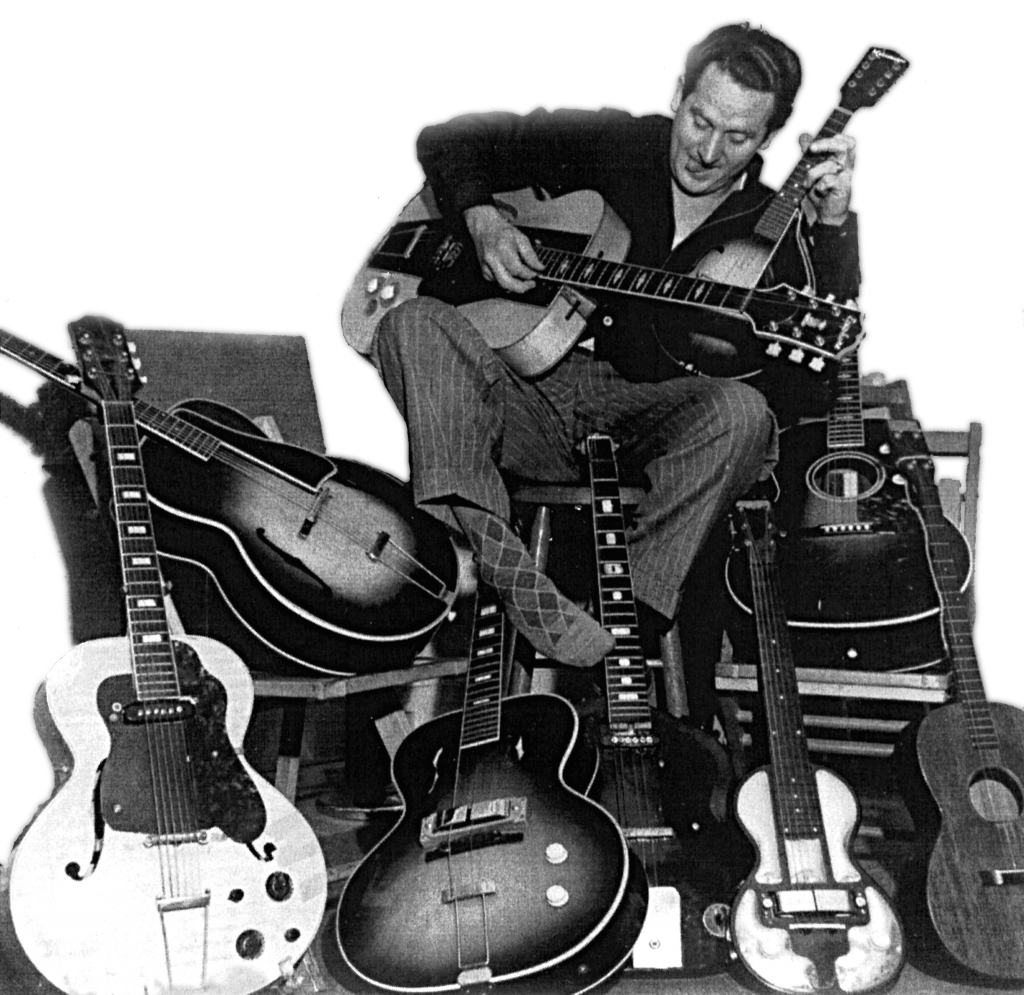From a very early age, it was obvious that young Lester William Polsfuss had a knack for music. But by his mid teens, it became clear that it was more than just a knack; he was virtually a prodigy. Starting around eight years old, young Lester toyed with anything he could get a melodic sound out of, but, after picking up a guitar, his obsession and passion for sound quickly blossomed into a fruitful career that would go down in music history.
Before he was even a teenager, he was making money in tips performing around his hometown of Waukesha, Wisconsin. By 1934, Lester, then in his early teens, had dropped out of high school and was performing in and around Chicago. He had encountered many obstacles of the music electronics of the day.[1. Salem Press Biographical EncyclopediaResearch Starters, 2017, s.v. “Les Paul,” by John R. Holmes.] Guitars were simple and all somewhat similar, and recording music with a full band was a troublesome and repetitive ordeal. He did not intend to be limited by either of these issues. Rather than fall into the repetition of the music industry of his day, he began to set himself apart by experimentation.
Lester’s instrument ideas were at first shot down by large corporations. In 1941, he even brought one of his first solid-body guitar prototypes to Gibson, but the company quickly dismissed him.1 This rejection seemed to motivate him even more, and he returned to the drawing board while his performing career began to culminate.
He despised the fact that his early music sounded so similar to other artists of the day. Because of this, in 1947, Polsfuss started his own recording studio, in which he began utilizing over-dubbing and multitrack recording, which allows one musician to record one instrument at a time and overlay them so that it seems that they are being played at the same time.2 Although it was at first a venture for his own personal music, many musicians flocked to his home studio wanting to be recorded by Lester.
Just as these endeavors were taking off, in 1948, Lester suffered an almost career ending injury, in which his elbow was crushed beyond the point of reconstruction. He made the choice to have his right arm permanently set at less than a 90 degree angle, leaving him the ability to cradle a guitar.3 This action alone is a prime example of the dedication that Polsfuss possessed. Instead of letting his accident end his playing, or let his early failures deter him, he continued to strive to improve and increase the options for creativity that musicians had. He tried again to invent a solid body guitar and new sound recording techniques, all while continuing to work on his own music.
His talent on the guitar gained him so much attention that Gibson, while still unwilling to accept his prototype guitar model, decided to hire him as somewhat of a consultant.4 They wanted his name associated with their product, and they wanted his unmatched innovative mindset. The company created their own solid-body guitar model with the help of Lester, and the name came naturally.5 The Les Paul guitar was created, while Lester came to reach the pinnacle of his fame.

Unwillingness to settle was what set Lester apart from other musicians of the day—his constant need to experiment and create something better or at least different. Rather than just becoming the best he could be at the instruments of the day, he almost seemed more interested in creating new and improved devices to improve his playing. Without this determination, he might have just been another musician in history.
Les Paul, suffering from injury, old age, and arthritis, still continued to play guitar and work with music until his death in August of 2009.3 His lifetime achievements consist of his induction into the Rock and Roll Hall of Fame in 1988, a National Medal of Arts in 2007, multiple Grammys and Emmys, and countless other honors. While his guitar playing styles were an influence to guitarists everywhere, his greatest influences on the music industry were his help in creating a solid body guitar and his creation of over-dubbing and multi-track recording, which have been used by almost every musician since. His name has been immortalized in music history because of his contributions, and any fan or member of the music community has reason to thank him.
- Paul Verna, “‘Just A Pure Genius’: celebrating the legacy of Les Paul, the tinkerer who (really) helped invent rock’n’roll,” Billboard, (2015): 67. ↵
- “The Man Before The Guitar: Remembering Les Paul At 100,” All Things Considered, (June 9, 2015). ↵
- Salem Press Biographical EncyclopediaResearch Starters, 2017, s.v. “Les Paul,” by John R. Holmes. ↵
- “Les Paul and the Electric Guitar,” Innovation Masters: History’s Best Examples of Business Transformation, (2012): 196-199. ↵
- Calen D. Stone, “Paul, Les,” Contemporary Musicians, Vol. 2, (1990): 186-188. ↵
- Salem Press Biographical EncyclopediaResearch Starters, 2017, s.v. “Les Paul,” by John R. Holmes. ↵



52 comments
Cooper Dubrule
I find it astonishing that despite his injury, Lester persisted with his passion for music and playing the guitar. Prior to reading this article I had never heard of Lester Polsfuss however now I know that he may just be one of the most important figures in music because of multi-track recording since most songs today depend on that. I like the way this article gave background and insight to his personal life as well as his contributions to the musical world.
Enrique Segovia
I have always being a fan of Slash, the former lead guitarist of Guns N’ Roses, and his trademark guitar was a Gibson Les Paul; henceforth, my love towards Les Paul guitars began. As a guitar player, I am very knowledgeable about this guitar and the man behind this prototype. However, I learned from this article that he was actually rejected from Gibson, which surprises me given his fame and success. This is a man I admire because he fought for his guitar style, and caught the attention of one of the main guitar producers in the world. Interestingly enough, I have heard that Gibson has filed bankruptcy due to unpaid multimillionaire debts; regardless of this, Les Paul remains a name which I venerate.
Maisie Favila
As someone who owns a Les Paul guitar, I found this article intriguing due to the fact that I learned so much about him and his story. It’s crazy to find out that Gibson dismissed his ideas and now he is one of the best inventor and musician known. The article also reminded me that even if one person turns you down, you can revive yourself despite the obstacles thrown your way.
Martina Rodriguez
I love how well the author explains Les Paul’s beginnings. It’s interesting to see how the state of the music industry was before he produced his iconic guitars. Even more interesting is how the music industry didn’t see the potential in his designs at first. I had no idea he was so instrumental in the beginning of the recording overlay movement, that was interesting to read about. The break up of the article (the short paragraphs) was very easy to follow and made the reading that much more enjoyable.
Didier Cadena
As a fan of guitars, this was a really interesting read because of how informant Les Paul was to the guitar world. He was way ahead of his time and that really shows because of his ideas on what a guitar could be. I was not familiar with him outside of guitars, so this was a new perspective of him for me. The article does a great job of putting the story of his success together and still make it interesting to read.
Isaac Saenz
I have always heard of the name “Les Paul” around guitar shops but never knew the story or man behind it. This article offered me some insight on who he was and how his legacy came to be. I was very impressed by his motivation and efforts to continue playing/working after such a tragic injury. This article was well written and an interesting read. Bravo.
Luis Morales
This was a great article. I love the story of Paul’s dedication to playing the guitar. It is amazing to me that Paul would rather have his arm in a 90-degree angle, than give up his dream of playing the guitar. Through all the obstacles Les faced he never gave up, even when multiple music companies rejected him and his ways. However, Les Paul was still able to cement himself in music history.
Elias Garza
This article gave me great joy as it motivated me to always follow my dreams. Despite all the doubt and discouraging events that Les Paul encountered, he still knew what his vision was and pursued it. I aspire to be like that, in the sense of never giving up on what I am motivated to do. Those who are consistent are the ones who are successful because those who end up giving up have no chance at pursuing anything they want.
Auroara-Juhl Nikkels
To be honest, I had never heard the name Les Paul. While I love music, the history is truthfully not the most interesting to me. That being said, I did find our article very good and well written. The rejection he got from Gibson reminds me that 19 editors turned down J K Rowling before she was finally published. Much like her, Les Paul was still able to cement himself in music history and make those who rejected him at first regret it now.
Constancia Tijerina
I would be lying if I said I knew exactly who Les Paul is even though me and my father own a couple guitars of his. I find this article so inspiring to hear, all the criticism and so many rejections only to become one of the most successful people to come into this world. It amazes me how many years and how long it took for him to become so successful. Furthermore, I believe this article to be truly inspiring and motivational of how success doesn’t take a day to happen.